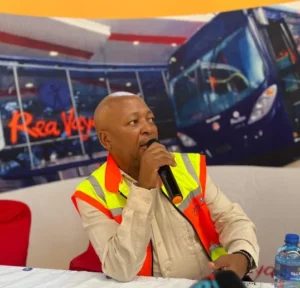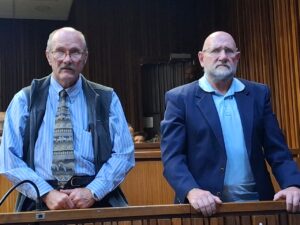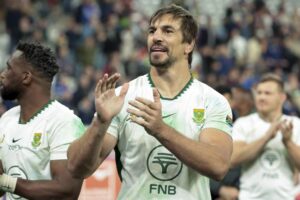By: The Saturday Star
Johannesburg Dr Sizwe Mpofu-Walsh admits it wasn’t an easy task writing his latest book ’The New Apartheid’, which launched in South Africa last month.
The author and activist explores how apartheid has reinvented itself, and how the edifice of systemic racial oppression continues to thrive in South Africa, despite a democratic system.
“This was a very difficult book to write,” Mpofu-Walsh told the Saturday Star.
“The hard part was going back into the apartheid archives, reading apartheid’s thinkers and its ideologues, and its academics and politicians, and appreciating the sheer scale of the apartheid project.
“Since 1994, we have mistakenly assumed that we have destroyed that project, but that project is alive and well, and it continues to adapt – even though there’s no single individual or political party driving it,” added Mpofu-Walsh.
Mpofu-Walsh, the son of well-known politician Dali Mpofu and activist Theresa Oakley- Smith, took three years to compile the book, with the majority of it being written between early 2020 and mid-2021.
We spoke to Mpofu-Walsh to give us an insight into his political views and what his family thinks of the book.
What is The New Apartheid all about?
The book is founded on a single idea that apartheid didn’t die, it was privatised. So, essentially, I am trying to puncture the myth that apartheid ended in 1994, and I am seeking to show how it continues to live, even in democratic South Africa.

Why do you think systematic racial oppression continues to this day in SA?
It continues to this day because it has a structural foundation. The architects of apartheid were always clear that they wanted apartheid to outlive even a democratic state. And so we have only scratched the surface of apartheid by creating a democratic government but, in all the other spheres of South African life outside voting for our government, and the public nature of government, in all spheres outside of those spheres, apartheid continues to persist and the private realm is often more powerful than the public realm.
What are you hoping people learn from this book?
I hope that they realise the scale of challenges that confront us, and how important it is to uproot apartheid in all its forms. We have spoken about decolonisation in the last five years, but we also need to not just remove the elements of colonialism in our society, but actually the elements of apartheid which are similar to colonialism, but are special to South Africa.
In terms of your experience, how enjoyable was it to put together your new book?
As I say, it wasn’t an easy writing process, but I think you’ll see from the second book, as opposed to the first book, I’ve grown a lot as a writer and I have grown a lot as a researcher. I completed my PhD at Oxford between the first and second book and many people say that this book is much better than the first one, much more rigorous, and better written. That was enjoyable, to master the craft of writing further and to become better as a writer.
What do you make of the political state of SA currently?
I think people have fallen victim to a flawed assumption that President Cyril Ramaphosa can solve SA’s crisis, but all President Ramaphosa can do is prolong the agony of ANC misrule and put a band aid over the various political crises that our country confronts through piblic relations spin. So, ultimately, we are in a state of denial about the real crisis in our society, and those governing us either don’t have the will or ability to confront and uproot the new apartheid, and they have simply decided to tinker around the margins.
If you were president of South Africa, what are the first three things you would tackle that you think needs the most attention?
I’m going to answer this slightly differently. In the conclusion of the book, I call for a new republic, and what I mean by that, is that we don’t just need to change policy, we don’t just need to look at new political alternatives, we need a fundamental reformation of our entire state, and that means looking very closely at the Constitution and preserving parts of it that have served us, and abandoning those parts that haven’t, and moving on to a new republic.
So this republic we are in now is the first democratic republic and now we need to imagine a second democratic republic. Many countries have done this, France is on its fifth republic, for example. So major constitutional changes are always part of dynamic democracies and we need to start re-imagining South Africa anew, because this version of SA has reached its sell-by date.
What does your family think of your new book? And what do they think of your political views and what you stand for?
My family is very supportive of the book. My mother and my father, who are very political, have read it and have said they enjoyed it. My views are not always exactly the same as either one of my parents, or anyone in my family, but we have a mature political conversation and we always talk about politics. We agree and disagree on various issues, and that’s similar to most families I suspect.
How important was it for you to establish your own identity, political views and thoughts, and step away from your dad’s ‘shadow’?
I just don’t think about that. I try to say what I believe. I’ve got a PhD from Oxford and if anyone thinks I merely parrot the views of one of my parents, I don’t know why it would be so. I think there’s a certain patriarchal assumption that people are seen through the lens of the most powerful men in their life, and that often erases my mothers contribution to my parentage. I’ve learnt to ignore that. If people want to judge a book by its cover, excuse the pun, they are missing out on a well-researched book that is trying to make a bigger point than any particular family tie.
What have you personally made of the recent looting and destruction that occurred in parts of South Africa?
I think that we should think very carefully and very deeply about some of the messages that were sent in the unrest. While certain aspects of the unrest seem to have been coordinated, especially in the early phases, I think the spontaneous aspects – which reached tens of thousands of people – spoke to the extreme levels of desperation that has taken hold in democratic South Africa, and that people are deeply frustrated with an economy that continues to lock them out of even being able to partake in buying very basic goods and services. And so I think it was a warning shot that South Africa is heading for an extreme crisis – unless we change course and tackle the new apartheid. I think that the book has become an interesting way of understanding the process of unrest that happened in South Africa.
In terms of politicians and leaders, who do you personally look up to?
I think if there’s one politician, and I’m not going to mention anyone currently, it’s Chris Hani, who I was lucky enough to meet when I was a toddler.
In your opinion, what makes a great leader?
Great leaders combine various things. The first thing is imagination. An ability to see a different future. One that goes beyond commonly held assumptions. But imagination is not enough. You need the wear, with all and the energy and the capacity to deliver on that vision, and so doing so further requires a degree of bravery and courage, but one also has to balance that against ethical behaviour and enduring that. In pursuit of the vision, one does not derail the ultimate mission through breaches of ethical and moral codes. Combining all those things is very rare, and that is why great leadership is very rare, and even more rare in South Africa today.






